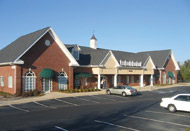|
COVER STORY, NOVEMBER 2005
THE REIT STUFF
REITs are ramping up activity across the Southeast.
Dan Marcec
Real Estate Investment Trusts (REITs) have been acquiring and developing land throughout the southeastern United States, thus affecting the dynamic of the commercial real estate market. Southeast Real Estate Business had a chance to speak with executives from Equity One, Windrose Medical Properties Trust, Wells Real Estate Funds and GMH Communities Trust about their recent activities and successes.
Equity One
North Miami Beach, Florida-based Equity One was founded in 1992; primarily, the company focuses on the acquisition and development of supermarket-anchored shopping centers. Equity One has been quite active, extending from North Miami Beach all the way to the Northeast in Boston, then all the way west to Texas as well. Recently, Equity One has acquired land for development in Georgia, and it is undertaking a redevelopment of a shopping center in North Carolina. Not only does Equity One engage in ground-up development, but also the company endeavors upon additions, expansions and remodeling throughout its portfolio.
“Overall, it's been a very good year for us,” says Chaim Katzman, chairman and CEO of Equity One. “It's been a year of growth, as we've entered into more development and redevelopment of properties in addition to improving properties that have been residing in our portfolio for a while. We've pushed up our occupancy levels, pushed up our leasing spread, completed a development and we've broken ground on three additional developments.”
Furthermore, Equity One purchased a 150-acre tract of land in Pasco County, Florida, as well as buying land in other places; all in all, according to Katzman, 2005 has been a success.
Two of the major developments on Equity One's radar are located in Homestead, Florida, and Huntsville, Alabama. Both projects are Publix-anchored shopping centers. In Homestead, the company completed the Waterstone Shopping Center, an 80,000-square-foot retail development featuring Publix; Walgreens and Bank of America also have signed leases. The project opened officially on September 17th.
“Real Estate is about three things: location, location, location,” Katzman says. “Waterstone Shopping Center sits on a piece of land that we acquired 3 years ago, and in the meantime about 3,000 homes came in within 2 to 2.5 miles of the trade area. It's a unique project because we were able to build it right along with the rooftops. In addition, it's right off the Turnpike, so it's very convenient, very accessible, has ample parking, and it has great lighting, so it feels safe day and night.”
In Huntsville, Equity One acquired a piece of land last year, and it broke ground on a 70,000-square-foot, Publix-anchored retail project in July. With this project, Katzman explains that again the site is unique due to the surrounding demographics.
“Any time a supermarket of Publix's stature signs on for 25 years, it attests to the uniqueness of your site,” he notes. “If you go to the roof counts and the people count, you'll see that the location again is a key to this, and any, development's success.”
Windrose Medical Properties Trust
 |
Windrose acquired Johns Creek I, II and III near Suwanee, Georgia, for $15.3 million.
|
|
Windrose Medical Properties Trust formed in 2002 out of the wholly owned development subsidiary Hospital Affiliates Development Corporation (HADC), which formed in 1976. Windrose has corporate offices in Indianapolis and Nashville, Tennessee, the latter being the residence of HADC. The company both acquires and develops medical offices and other special medical properties including inpatient and outpatient facilities. “Our strategy is to acquire $100 million and place $50 million under development annually,” explains Fred Farrar, president and chief operating officer for Windrose Medical Properties Trust. “To date in 2005, we have acquired $86 million, and our development assets—approximately $55 million—are to come on line later this year.” According to its model, 2005 appears to be a success.
Generally, Windrose holds properties in Atlanta, the Carolinas and in Florida. The company is looking at properties in Birmingham, Alabama, as well, and from a development standpoint, it expects to embark upon future projects in Tennessee.
 |
Windrose Medical Properties Trust has acquired the 137,760-square-foot Palm Court Plaza located at the Delray Medical Center in Delray Beach, Florida, for $25 million.
|
|
This year, Windrose hasn't developed anything in the Southeast as of yet; however, it acquired two major properties in the Atlanta area as well as in Delray Beach, Florida. Northeast of Atlanta near Suwanee, Georgia, Windrose purchased Johns Creek I, II and III, a nine-building, 72,404-square-foot property. The sales price for that property was $15.3 million. Then, in Delray Beach, the company acquired Palm Court Plaza, which is a 137,760-square-foot property on campus at the Delray Medical Center. Palm Court Plaza cost $25 million. “We definitely feel like the Southeast is a good market for us,” Farrar says. “We expect to acquire more assets in Florida, and we have a development project on which we're hopeful to get the green light; that also is located in Florida. Generally, our relationships expand across the southern half of the United States; we go out to California and we're fairly active in Texas. In all of those markets we see ourselves as particularly successful.”
For the foreseeable future, Farrar notes that Windrose's strategy will remain the same. In the next year, the company plans to acquire approximately $100 million in assets just in the Southeast. Furthermore, it has several prospects in the pipeline, though nothing has been announced and the timing is uncertain. Regardless, the company plans to continue its strong activity in its successful southeastern markets.
Wells Real Estate Funds
Wells Real Estate Funds is a national REIT based in Norcross, Georgia, just outside of Atlanta. The company deals mostly with office space, both downtown and suburban properties, with about 95 percent of the company's acquisitions coming from developments in this sector. Traditionally, Wells undertakes development endeavors in a venture with more classic developers, constructing build-to-suit projects for corporate tenants.
“We've done fairly well in 2005, as we're closing in on $1 billion in purchases year-to-date,” says Joe Oglesby, senior vice president—acquisitions for Wells Real Estate. “Primarily we focus on office buildings that are fully leased, and we've acquired properties pretty much all across the country. In the Southeast, currently we're focused mainly on the Charlotte, North Carolina, market as well as the Orlando, Tampa and South Florida sectors.”
This year, Wells has been involved in both development ventures as well as real estate transactions. For example, in conjunction with Childress Klein, Wells has developed a three-story, 165,000-square-foot, Class A call center for Citigroup. The development is located off Interstate 77 in Fort Mill, South Carolina, just outside Charlotte. Citigroup has signed a 15-year lease on the property.
“Wells became involved with this project through our relationship with Citigroup, and we're developing a relationship with Childress Klein,” Oglesby notes. “There was an opportunity in the market, so we took advantage. The main reason Citigroup decided to locate at this site is that the state of South Carolina offers very attractive economic incentive packages.”
 |
BlueLinx Corporation has signed a lease at 4100/4300 Wildwood Parkway in Atlanta with Wells Real Estate Funds.
|
|
In addition to this development venture, Wells completed the disposition of 27 of its office and industrial properties in the spring. Many of these developments were located in the Southeast. New York-based Lexington Corporate Properties Trust purchased the 5.1 million-square-foot portfolio for $786 million. Eastdil Realty handled brokerage negotiations on behalf of Wells in this transaction.
Furthermore, as a gauge of Wells' expansive coverage, the company also signed BlueLinx Corporation to an extended 13-year lease within its corporate headquarters. BlueLinx will occupy 250,000 square feet at 4100/4300 Wildwood Parkway in Atlanta as of January 2006. Patti Morris and Jerry Banks of Wells Real Estate Funds represented Wells in the lease, and Duncan Gibbs and Chris Wagner of the Staubach Company represented BlueLinx.
“Historically, we've focused on build-to-suits, but we're starting to broaden that,” Oglesby explains. “We're beginning to look at opportunities with some remaining space to be leased. Currently, Wells is in the process of creating a new marketing strategy for our development program, and we're hoping to ramp up development substantially in order to obtain broader coverage.”
GMH Communities Trust
Based in Newtown Square, Pennsylvania (just outside Philadelphia), GMH Communities Trust formed as a public entity in 2004. Overall, though, it has been in the student housing real estate business since 1985. The company only deals with housing communities, with about 80 percent of its existing portfolio consisting of off-campus student housing properties; approximately 20 percent of its portfolio is on-base military housing.
GMH both acquires and develops properties. Thus far, most of the company's growth has been through acquisition of existing properties, yet currently it has four parcels of land, two of which are under development, one of which will begin construction this fall/winter, and the fourth will be developed when the market is right. In addition, the company does not shy away from redevelopments, as it often acquires properties in need of renovation and repositioning.
“In the Southeast, Florida continues to be a hot market for student housing, and with the HOPE Scholarship, Georgia has a good student enrollment demographic as well,” explains Brad Harris, senior vice president and chief financial officer for GMH Communities Trust. “We specifically look at markets with increasing student properties, those with high barriers to entry, in which there's not a lot of land to build additional product in close, and schools with 5,000 to 20,000 students.”
For 2005, GMH expects to acquire approximately $550 million worth of assets. The company is in the process of closing deals for two other student apartment communities: Aspen Apartments serves the University of Georgia in Athens, Georgia; and Pegasus Connection serves University of Central Florida in Orlando, Florida. Both properties are under letters of intent. In addition, GMH is in exclusive negotiation for Fort Gordon, a military base in Augusta, Georgia. On the military side, companies have to bid on communities and they are awarded by the institution.
“When we think about student housing, initially, many people think of dorm-type space,” says Harris. “The unique thing about our communities is that they are more garden-style apartments. They are in close proximity to the schools, and they also feature swimming pools, tennis courts, basketball courts; most of them are comparable if not even less expensive than dorm space on campus, so it's a different high-end product.”
“We're seeing development as a very attractive option,” Harris continues. “We'll look for markets where we can add value, where we can effectively operate the property, and we'll find opportunities to increase leasing and redevelop if necessary.”
©2005 France Publications, Inc. Duplication
or reproduction of this article not permitted without authorization
from France Publications, Inc. For information on reprints
of this article contact Barbara
Sherer at (630) 554-6054.
|
